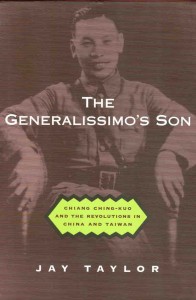 In this book, The Generalissimo’s Son: Chiang Ching-kuo and the Revolutions in China and Taiwan (2000, ISBN 0-674-00287-3), Jay Taylor provides a fascinating history of the man who presided over much of the political modernization of Taiwan. Ching-kuo was, at one point, a communist student in the Soviet Union, and maintained ties there throughout his life (his wife, Faina, was Russian). He also kept open communications with mainland China, Singapore (he was good friends with Lee Kwan-yew), and, of course the United States.
In this book, The Generalissimo’s Son: Chiang Ching-kuo and the Revolutions in China and Taiwan (2000, ISBN 0-674-00287-3), Jay Taylor provides a fascinating history of the man who presided over much of the political modernization of Taiwan. Ching-kuo was, at one point, a communist student in the Soviet Union, and maintained ties there throughout his life (his wife, Faina, was Russian). He also kept open communications with mainland China, Singapore (he was good friends with Lee Kwan-yew), and, of course the United States.
A political moderate, Ching-kuo adroitly juggled the disparate factions in Taiwan, which included the allies of his father Chiang Kai-shek (Taylor’s subsequent history of Kai-shek, The Generalissimo: Chiang Kai-Shek and the Struggle for Modern China is also a must-read for anyone wishing to gain insight into the Taiwanese and Chinese dynamic in the 20th century). For many in the west, Ching-kuo is perhaps best noted for guiding Taiwan away from authoritarian rule and accepting forms of dissent, and creating an environment conducive to becoming a technological giant.
During most of Ching-kuo’s life, the Kuomintang (KMT) was the Republic of China’s (the official name of Taiwan) only political party, but the book describes how Ching-kuo’s politics began to change, especially with Gorbachev’s success in opening up the Soviet Union’s political system. He rejected cronyism, and made tough decisions in order to ease out political allies who, he felt, would not follow the path he increasingly took too political reform. The book offers numerous insights into his personality:
The “friends of Ching-kuo” club convened with their wives at the house on Ch’angan East Road or at the Yangming Mountain house, calling the latter “The Drunken House” after a famous restaurant in Ch’engtu. When each new dish arrived, the whole table would toast, draining their glasses of rice wine. Of course the finger game was the most dangerous event, with the defeated draining not a small tumbler but a vessel of wine. Ladies as well as gentlemen slipped under the table. But the Dean (as he was still known to his pre-iQ49 friends — even after he became president) never seemed besotted. Occasionally, the guests left with different shoes or coats than the ones with which they arrived. Wives were not among the items confused at such times, but the occasions may have led to some of the affairs Ching-kuo is alleged to have had with the spouses of subordinates. In public he was never seen accompanying a woman other than Faina, but he did apparently carry on several liaisons in the 1950s and 1960s.
As Ching-kuo’s power increased, he tried to maintain his contact with ordinary people by taking Sunday walks in the countryside. From 1950 until he became president in 1978, he visited 320 towns and villages, dropping in on families unannounced and eating a simple lunch with the locals in dirt-floored cafes. Sometimes he took dried noodles along to supply his own food. Even in Taipei in the 1950s he occasionally drove himself around town unescorted. One dav, when driving a Jeep back to the city, he picked up a hitchhiker. He asked the man where he was going and then went out of his way to let the rider off at his destination. The man thanked him and rewarded him with a NT $10 tip. Ching-kuo accepted the note and when he arrived home gave it to Faina. “Look,” he said, “I actually earned some money today.”
The author refers to Ching-kuo as “a master of toughness and finesse,” a theme recurrent throughout this 520 page book. The book is recommended for anyone wishing to understand the progression of Taiwan from an authoritarian regime to a more open political entity, and in the process, becoming an economic power. Buy it now at the WoWasis eStore.
Leave a Reply